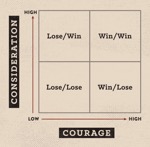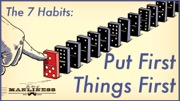Cumulative Breach Of Ethics Upheld As Proper Dismissal For Cause
Monday, December 03, 2018 - Filed in: Court Cases
Asserting and establishing just cause when faced with an action of wrongful dismissal is a difficult and often unsuccessful avenue for employers. Establishing an employee has committed acts or omitted to perform the responsibilities of their position therefore disentitling them to common law reasonable notice is a high burden. The height of the legal burden will differ depending on the type of cause asserted, but it remains an uphill battle for employers regardless of whether the cause is framed as insubordination, theft, fraud or a combination of issues.
A decision from the Court of Queen's Bench of Alberta provides a useful illustration of how cumulative improper acts can amount to just cause. The decision, Molloy v. EPCOR Utilities Inc. involved an employee that was dismissed in 2009 following an investigation into complaints of breaches of the employer's Ethics and Respectful Workplace Policies and improper conduct with another utility company. Read More...
A decision from the Court of Queen's Bench of Alberta provides a useful illustration of how cumulative improper acts can amount to just cause. The decision, Molloy v. EPCOR Utilities Inc. involved an employee that was dismissed in 2009 following an investigation into complaints of breaches of the employer's Ethics and Respectful Workplace Policies and improper conduct with another utility company. Read More...
False Allegations Of Cause Prove Costly For Employer
Friday, November 16, 2018 - Filed in: Court Cases
Employers who choose to raise unfounded allegations of just cause for strategic reasons, to avoid severance costs or to use such allegations as leverage to reduce their severance obligations, ought to beware. The end result could be more costly. This clear message was sent to an Ontario employer, Altus Group Limited ("Altus"), in an Ontario Superior Court decision (Gordon v. Altus Group Limited, 2015 ONSC 5663). Read More...
Can Employers Terminate Disobedient Employees For Cause?
Monday, November 05, 2018 - Filed in: Court Cases
It is generally understood that employees must follow the lawful orders of their employers and may be disciplined for disobeying such orders. However, the more difficult question faced by employers is whether a disobedient employee can be fired for just cause. Although not every instance of disobedience will allow an employer to dismiss an employee for cause, the recent decision of the British Columbia Supreme Court in Cotter v. Point Grey Golf and Country Club, 2016 BCSC 10, confirms that an employer may have cause to terminate an employee whose repeated actions are willfully disobedient and "seriously incompatible with the employee's duties". Read More...
The Five Decisions that People Regret the Most
Thursday, November 01, 2018 - Filed in: General Interest
The following is a reprint of an article by Travis Bradberry that appears in the Heleo web site.
Terminally ill patients report the same five regrets again and again. Here’s what we can learn from their wisdom.
Our days are filled with a constant stream of decisions. Most are mundane, but some are so important that they can haunt you for the rest of your life.
A recent study from Columbia University found that we’re bogged down by more than 70 decisions a day. The sheer number of decisions we have to make each day leads to a phenomenon called decision fatigue, whereby your brain actually tires like a muscle.
A new study from the University of Texas shows that even when our brains aren’t tired, they can make it very difficult for us to make good decisions. When making a decision, instead of referencing the knowledge we’ve accumulated, our brains focus on specific, detailed memories.
For example, if you’re buying a new car and trying to decide if you should go for the leather seats, even though you know you can’t afford it, your brain might focus on memories of the wonderful smell and feel of the leather seats in your brother’s sports car, when it should be focused on the misery you’re going to experience when making your monthly car payments. Since you don’t have memories of this yet, it’s a hard thing for your brain to contemplate.
Some decisions are minor, such as what to eat, which route to drive to work, or in what order to tackle tasks; others are more difficult, such as choosing between two job offers, whether to move to a new city for someone you love, or whether to cut a toxic person out of your life. Regardless of the magnitude of the decision, our brains make it hard for us to keep the perspective we need to make good choices.
Bronnie Ware spent her career as a palliative care nurse, working exclusively with people who were 3 to 12 months from death. She made a habit of asking them about their greatest regrets, and she heard the same five regrets time and time again. By studying these regrets, you can make certain that you make good choices and don’t fall victim to them yourself. Read More...
Terminally ill patients report the same five regrets again and again. Here’s what we can learn from their wisdom.
Our days are filled with a constant stream of decisions. Most are mundane, but some are so important that they can haunt you for the rest of your life.
A recent study from Columbia University found that we’re bogged down by more than 70 decisions a day. The sheer number of decisions we have to make each day leads to a phenomenon called decision fatigue, whereby your brain actually tires like a muscle.
A new study from the University of Texas shows that even when our brains aren’t tired, they can make it very difficult for us to make good decisions. When making a decision, instead of referencing the knowledge we’ve accumulated, our brains focus on specific, detailed memories.
For example, if you’re buying a new car and trying to decide if you should go for the leather seats, even though you know you can’t afford it, your brain might focus on memories of the wonderful smell and feel of the leather seats in your brother’s sports car, when it should be focused on the misery you’re going to experience when making your monthly car payments. Since you don’t have memories of this yet, it’s a hard thing for your brain to contemplate.
“I am not a product of my circumstances. I am a product of my decisions.” –Stephen Covey
Some decisions are minor, such as what to eat, which route to drive to work, or in what order to tackle tasks; others are more difficult, such as choosing between two job offers, whether to move to a new city for someone you love, or whether to cut a toxic person out of your life. Regardless of the magnitude of the decision, our brains make it hard for us to keep the perspective we need to make good choices.
Bronnie Ware spent her career as a palliative care nurse, working exclusively with people who were 3 to 12 months from death. She made a habit of asking them about their greatest regrets, and she heard the same five regrets time and time again. By studying these regrets, you can make certain that you make good choices and don’t fall victim to them yourself. Read More...
Are Bonuses Really Just "Bonuses"? A Look At Whether Bonuses Are Payable Post-Termination
Wednesday, October 31, 2018 - Filed in: Court Cases
With the waves of layoffs and terminations this year, a question asked frequently by employers and employees alike is, "Are employees entitled to their share of bonuses for the time they worked prior to their termination?"
Many employees . . . have arrangements where bonuses (and other forms of incentive compensation, such as stock options and share units) form a significant part of their total compensation. A departing employee may be giving up a considerable sum if the termination of employment means forfeiting bonuses for the period he or she actively worked prior to the termination notice. It is a crucial question for all affected and, unfortunately, one that is consistently disputed between employers and employees.
The courts wrestle with the issue of enabling an employer to effectively exclude an employee from bonuses for the duties and services the employee performed prior to termination. A practice often in issue is that of an employer's timing the delivery of a termination notice right before the bonus payment date, to the detriment of the departing employee.
While there is no easy answer, there are common factors the courts consider in determining whether to award bonuses for work prior to the termination notice. These common factors include the terms of the contract, whether the bonus is integral to the employees' total compensation and whether the notice period includes the date when the employees would normally be paid their bonuses. Read More...
Many employees . . . have arrangements where bonuses (and other forms of incentive compensation, such as stock options and share units) form a significant part of their total compensation. A departing employee may be giving up a considerable sum if the termination of employment means forfeiting bonuses for the period he or she actively worked prior to the termination notice. It is a crucial question for all affected and, unfortunately, one that is consistently disputed between employers and employees.
The courts wrestle with the issue of enabling an employer to effectively exclude an employee from bonuses for the duties and services the employee performed prior to termination. A practice often in issue is that of an employer's timing the delivery of a termination notice right before the bonus payment date, to the detriment of the departing employee.
While there is no easy answer, there are common factors the courts consider in determining whether to award bonuses for work prior to the termination notice. These common factors include the terms of the contract, whether the bonus is integral to the employees' total compensation and whether the notice period includes the date when the employees would normally be paid their bonuses. Read More...
How to Give a Gift to a Woman
Wednesday, October 17, 2018 - Filed in: General Interest
The following is a reprint of a guest article by Candace Moody that appears in the Art of Manliness web site.
Men have been giving gifts to women since the first Neanderthal offered his crush a polished wolf femur. In the millennia that have followed, homo sapiens invented the wheel, the laptop, the foam fan finger, and put a man on the moon. But men have not yet developed a system for buying the women in their lives meaningful gifts for special occasions. As a public service, I offer this gifting system for homo sapiens and homo inermis. Read More...
Men have been giving gifts to women since the first Neanderthal offered his crush a polished wolf femur. In the millennia that have followed, homo sapiens invented the wheel, the laptop, the foam fan finger, and put a man on the moon. But men have not yet developed a system for buying the women in their lives meaningful gifts for special occasions. As a public service, I offer this gifting system for homo sapiens and homo inermis. Read More...
Supreme Court of Canada rules Crown has no duty to consult First Nation regarding law-making process.
Thursday, October 11, 2018 - Filed in: Court Cases
"In April 2012, two pieces of omnibus legislation with significant effects on Canada’s environmental protection regime were introduced into Parliament. The Mikisew Cree First Nation was not consulted on either of these omnibus bills at any stage in their development or prior to the granting of royal assent. The Mikisew brought an application for judicial review in Federal Court, arguing that the Crown had a duty to consult them on the development of the legislation, since it had the potential to adversely affect their treaty rights to hunt, trap, and fish under Treaty No. 8. The reviewing judge granted a declaration to the effect that the duty to consult was triggered and that the Mikisew were entitled to notice of the relevant provisions of the bills, as well as an opportunity to make submissions. On appeal, a majority of the Federal Court of Appeal concluded that the reviewing judge erred by conducting a judicial review of legislative action contrary to the Federal Courts Act . The majority held that when ministers develop policy, they act in a legislative capacity and their actions are immune from judicial review. It deemed the reviewing judge’s decision to be inconsistent with the principles of parliamentary sovereignty, the separation of powers, and parliamentary privilege. The Mikisew appealed."
The S.C.C. held (9:0) (with reasons for judgment by Karakatsanis J. [Wagner C.J. and Gascon J. concurring]. As well as separate concurring reasons by Abella [Martin J. concurring], Brown J., and Rowe J. [Moldaver and Côté JJ. concurring]), that the appeal is dismissed. Read More...
The S.C.C. held (9:0) (with reasons for judgment by Karakatsanis J. [Wagner C.J. and Gascon J. concurring]. As well as separate concurring reasons by Abella [Martin J. concurring], Brown J., and Rowe J. [Moldaver and Côté JJ. concurring]), that the appeal is dismissed. Read More...
Be Careful What You Wish For: Ontario Court Holds That An Employee Cannot Rescind A Clear And Voluntary Notice Of Resignation
Wednesday, October 03, 2018 - Filed in: Court Cases
In English v Manulife Financial Corporation, the Ontario Superior Court of Justice considered whether an employee who has voluntarily resigned may later rescind her notice of resignation or retirement. The court found that while an employer may voluntarily accept such a rescission, it is not required to do so. Read More...
Never Complain; Never Explain
Wednesday, September 26, 2018 - Filed in: General Interest
The following is a reprint of an article by Brett and Kate McKay that appears in the Art of Manliness web site.
Never complain; never explain.
This pithy little maxim was first coined by the British politician and prime minister Benjamin Disraeli, and adopted as a motto by many other high-ranking Brits — from members of royalty, to navy admirals, to fellow prime ministers Stanley Baldwin and Winston Churchill. The maxim well encapsulates the stiff-upper lipped-ness of the Victorian age, but the timeless wisdom it contains has made it a guiding mantra of powerful, confident, accountability-prizing men up through the modern day.
The “nevers” of course aren’t ironclad and don’t apply to every situation, and even when they should apply, they can be hard to follow through on! But understanding when, where, and why to apply this maxim is truly a great help in becoming a more autonomous and assertive man.
Its four words pack a lot of truth in a small space and work on a few different levels. So let’s unpack them, starting with the meat of the matter — “never explain” — and working backwards. Read More...
Never complain; never explain.
This pithy little maxim was first coined by the British politician and prime minister Benjamin Disraeli, and adopted as a motto by many other high-ranking Brits — from members of royalty, to navy admirals, to fellow prime ministers Stanley Baldwin and Winston Churchill. The maxim well encapsulates the stiff-upper lipped-ness of the Victorian age, but the timeless wisdom it contains has made it a guiding mantra of powerful, confident, accountability-prizing men up through the modern day.
The “nevers” of course aren’t ironclad and don’t apply to every situation, and even when they should apply, they can be hard to follow through on! But understanding when, where, and why to apply this maxim is truly a great help in becoming a more autonomous and assertive man.
Its four words pack a lot of truth in a small space and work on a few different levels. So let’s unpack them, starting with the meat of the matter — “never explain” — and working backwards. Read More...
Employers Not Obligated To Accommodate Personal Choices – Including Breastfeeding
Tuesday, September 18, 2018 - Filed in: Court Cases
The Federal Court of Appeal has upheld the Public Service Labour Relations and Employment Board's (the "Board") decision that refusing an employee's request to telework fulltime so that she could continue to breastfeed her child was not discriminatory. Read More...
Supreme Court rules ISP's can recover reasonable costs of Norwich order compliance.
Monday, September 17, 2018 - Filed in: Court Cases
"The Respondents are film production companies that allege that their copyrights have been infringed online by unidentified Internet subscribers who have shared their films using peer to peer file sharing networks. They sued one such unknown person and brought a motion for a Norwich order to compel his Internet service provider (“ISP”), Rogers, to disclose his contact and personal information. The respondents sought that the disclosure order be made without fees or disbursements payable to Rogers, relying on ss. 41.25 and 41.26 of the Copyright Act . These provisions, referred to as the “notice and notice” regime, require that an ISP, upon receiving notice from a copyright owner that a person at a certain IP address has infringed the owner’s copyright, forward that notice of claimed infringement to the person to whom the IP address was assigned. They also prohibit ISP's from charging a fee for complying with their obligations under the regime. The motion judge granted the Norwich order and allowed Rogers to recover the costs of all steps that were necessary to comply with it. He found that while the statutory notice and notice regime regulates the process by which notice of claimed copyright infringement is provided to an ISP and an Internet subscriber, as well as the retention of records relating to that notice, it does not regulate an ISP’s disclosure of a subscriber’s identity to a copyright owner. The Federal Court of Appeal agreed with the motion judge that the statutory notice and notice regime does not regulate the disclosure of a person’s identity from an ISP’s records, but it confined Rogers’ recovery to the costs of complying with the Norwich order that did not overlap with the steps that formed part of Rogers’ implicit obligations under the statutory regime. Rogers appealed."
The S.C.C. (9:0) allowed the appeal and remitted to the motion judge to determine the quantum of Rogers’ entitlement to its reasonable costs of compliance with the Norwich order. Read More...
The S.C.C. (9:0) allowed the appeal and remitted to the motion judge to determine the quantum of Rogers’ entitlement to its reasonable costs of compliance with the Norwich order. Read More...
Turn Your Excuses Into Action: The “Do What You Can” Guide from the Blind, Teenage Leader of the French Resistance
Tuesday, September 11, 2018 - Filed in: General Interest
The following is a reprint of an article by Brett and Kate McKay that appears in the Art of Manliness web site.
A lot of people live in perpetual dissatisfaction with the state of the world.
They feel that virtues like integrity and courage are in short supply, that politics is an embarrassing circus, and that society is getting worse rather than better. And they feel powerless to do anything about it.
They say they’re too young or busy to accomplish anything important, or that they don’t have any gifts or talents to contribute, or that nothing they could do would make a difference anyway.
One man, a boy really, is uniquely suited to squash the ultimately empty excuses we all give for not taking action: Jacques Lusseyran, a little known hero of the French Resistance movement during World War II.
At the age of eight, Lusseyran lost his sight when he fell into the corner of a teacher’s desk at school, and one of the arms of his eyeglasses tore into his right eye. His left eye then suffered from “sympathetic inflammation,” and both were left completely blind.
In a time when the blind were often sidelined from mainstream society and sent to special schools, Jacques never wanted to be an exception or get treated with kid gloves; he went back to his old school, made many friends, rose to the top of the class, and joined with the other boys in their rough and tumble play.
Then in 1941, when he was just sixteen years old, Lusseyran created Volontaires de la Liberté — the Volunteers of Liberty — and recruited 600 of his peers into the French Resistance movement. With the Germans occupying the city of Paris where he lived, and censoring the news coming into France, he and his compatriots began publishing and distributing a bi-weekly underground news bulletin. The Volunteers of Liberty then joined with another, larger Resistance group, Défense de la France (Defense of France). Jacques served on the organization’s Executive Committee and editorial board, and used the little army of young men he had built up to distribute the DF’s own newspaper and grow its circulation to a quarter of a million.
Even when he was eventually arrested and held at the Buchenwald concentration camp, Lusseyran continued to resist the Germans and aid his fellow men — starting yet another covert news organization in order to build morale and encourage the hopes of his fellow prisoners.
Jacques Lusseyran perfectly embodied the maxim of Theodore Roosevelt to “Do what you can, with what you have, where you are.” At every turn, he could have made perfectly sensible excuses for sitting on his hands and doing nothing: “I’m blind! I’m only 16! I live in an occupied country!” Instead, he was always looking for some way to take action.
We have thus created this “Do What You Can” (DWYC) guide inspired by Lusseyran’s life. Below you’ll find 5 of the excuses people commonly give as to why they can’t make a difference, how the example Lusseyran set destroys that excuse, and the DWYC action principle you should replace it with. Read More...
A lot of people live in perpetual dissatisfaction with the state of the world.
They feel that virtues like integrity and courage are in short supply, that politics is an embarrassing circus, and that society is getting worse rather than better. And they feel powerless to do anything about it.
They say they’re too young or busy to accomplish anything important, or that they don’t have any gifts or talents to contribute, or that nothing they could do would make a difference anyway.
One man, a boy really, is uniquely suited to squash the ultimately empty excuses we all give for not taking action: Jacques Lusseyran, a little known hero of the French Resistance movement during World War II.
At the age of eight, Lusseyran lost his sight when he fell into the corner of a teacher’s desk at school, and one of the arms of his eyeglasses tore into his right eye. His left eye then suffered from “sympathetic inflammation,” and both were left completely blind.
In a time when the blind were often sidelined from mainstream society and sent to special schools, Jacques never wanted to be an exception or get treated with kid gloves; he went back to his old school, made many friends, rose to the top of the class, and joined with the other boys in their rough and tumble play.
Then in 1941, when he was just sixteen years old, Lusseyran created Volontaires de la Liberté — the Volunteers of Liberty — and recruited 600 of his peers into the French Resistance movement. With the Germans occupying the city of Paris where he lived, and censoring the news coming into France, he and his compatriots began publishing and distributing a bi-weekly underground news bulletin. The Volunteers of Liberty then joined with another, larger Resistance group, Défense de la France (Defense of France). Jacques served on the organization’s Executive Committee and editorial board, and used the little army of young men he had built up to distribute the DF’s own newspaper and grow its circulation to a quarter of a million.
Even when he was eventually arrested and held at the Buchenwald concentration camp, Lusseyran continued to resist the Germans and aid his fellow men — starting yet another covert news organization in order to build morale and encourage the hopes of his fellow prisoners.
Jacques Lusseyran perfectly embodied the maxim of Theodore Roosevelt to “Do what you can, with what you have, where you are.” At every turn, he could have made perfectly sensible excuses for sitting on his hands and doing nothing: “I’m blind! I’m only 16! I live in an occupied country!” Instead, he was always looking for some way to take action.
We have thus created this “Do What You Can” (DWYC) guide inspired by Lusseyran’s life. Below you’ll find 5 of the excuses people commonly give as to why they can’t make a difference, how the example Lusseyran set destroys that excuse, and the DWYC action principle you should replace it with. Read More...
Pornography In The Workplace: Trends And Developments
Wednesday, August 29, 2018 - Filed in: Arbitration Cases
In a 2013 Forbes article, Cheryl Conner noted that 25% of working adults admit to looking at pornography on a computer at work. Also interesting to note is that 70% of all online pornography access occurs between 9:00 a.m. and 5:00 p.m. Older statistics indicate that two-thirds of human resources professionals have discovered pornography on employee computers, and that 28% of surveyed workers had downloaded sexually explicit content from the web while on the job.
Against this backdrop, employers face an increased concern over the propriety of employees' digital conduct at work. In the school context, especially, it is essential that student safety is protected and the school's reputation is upheld.
Labour arbitrators in Canada have addressed these issues in the context of employees accessing pornography on work-issued computers, during work hours, and/or with students as the subjects of the images. While the principles in the decisions are similar, the outcomes have varied depending on a range of circumstances. Read More...
Against this backdrop, employers face an increased concern over the propriety of employees' digital conduct at work. In the school context, especially, it is essential that student safety is protected and the school's reputation is upheld.
Labour arbitrators in Canada have addressed these issues in the context of employees accessing pornography on work-issued computers, during work hours, and/or with students as the subjects of the images. While the principles in the decisions are similar, the outcomes have varied depending on a range of circumstances. Read More...
The 10 Commandments of Success
Thursday, August 23, 2018 - Filed in: General Interest
The following is a reprint of an article by Brett and Kate McKay that appears in the Art of Manliness web site.
Editor’s note: The following excerpt on the “The Ten Commandments of Success” is taken from The Business of Life (1916) by Frank Crane. It has been condensed from the original.
It is the purpose of this piece of writing to give a glimpse of the fundamentals of success. I would indicate, not all the elements, but what kind of elements they are that enter into a triumphant existence.
I do not have in mind success in your particular calling. I have nothing to say concerning some things in which you are much interested, to wit; how you can sell more goods in your grocery, how you can acquire prominence as an actor, how you can be elected to office, or get rich or play the fiddle, or write a best seller. But I shall speak of things that will result in such goods as your own self-respect, the love and esteem of those who know you, a settled feeling of courage toward destiny, of hope in the future and of satisfaction with the past – in other words, life success instead of vocational success.
Vocational training is necessary. But life training is more necessary. You ought to serve a thorough apprenticeship to become an expert mechanic, baker, or lawyer, and receive a business training to become a good secretary, but all that is not the prime business of school. For the first goal of education should be to make you a wholesome, efficient, and cheerful man.
There are two kinds of success: success of distinction and success of satisfaction.
Success of distinction means getting rich, or famous, or in some way marked out among your fellows.
There is no doubt that this kind of success tastes good and appeals to us all. We love the spotlight, like to see our names in the newspaper and our pictures in the magazine. We should be properly proud to have our names go down in history.
But this point should not be overlooked: that in this sort of success Chance plays a great part.
Distinction is always mixed with luck. Napoleon, Grant, Roosevelt, and Dickens undoubtedly were men of sound qualifications, yet there have been many with abilities quite as great who never got such prominence. Good fortune has not all to do with making a prominent person, but it always has something to do with it.
On the contrary with the success of satisfaction opportunity has nothing whatever to do. You can be happy, strong, efficient, lovable, not ashamed to look at your face in the glass, to draw your wages and to stand before the judgment seat; you can make your life a glad and not a sad affair, and you can do this despite all the gods on Olympus, despite all ill luck, sickness, and calamity, and in face of all the imps of perdition.
You can have the success of satisfaction as certainly as two and two make four. All you have to do is find the cosmic laws of the spirit and keep them. They are just as accurate as the laws of mathematics.
We shall therefore set down some hints toward success, and call them Ten Commandments. For they are very old, very obvious, and for all that very essential.
For success is not some novel thing, to be come at by a trick or new discovery, but by the well-worn path of wisdom, the road of sages from Moses to Maeterlinck, and our children’s children must perforce study the same map and observe the same landmarks that were known of our fathers’ fathers. Read More...
Editor’s note: The following excerpt on the “The Ten Commandments of Success” is taken from The Business of Life (1916) by Frank Crane. It has been condensed from the original.
It is the purpose of this piece of writing to give a glimpse of the fundamentals of success. I would indicate, not all the elements, but what kind of elements they are that enter into a triumphant existence.
I do not have in mind success in your particular calling. I have nothing to say concerning some things in which you are much interested, to wit; how you can sell more goods in your grocery, how you can acquire prominence as an actor, how you can be elected to office, or get rich or play the fiddle, or write a best seller. But I shall speak of things that will result in such goods as your own self-respect, the love and esteem of those who know you, a settled feeling of courage toward destiny, of hope in the future and of satisfaction with the past – in other words, life success instead of vocational success.
Vocational training is necessary. But life training is more necessary. You ought to serve a thorough apprenticeship to become an expert mechanic, baker, or lawyer, and receive a business training to become a good secretary, but all that is not the prime business of school. For the first goal of education should be to make you a wholesome, efficient, and cheerful man.
There are two kinds of success: success of distinction and success of satisfaction.
Success of distinction means getting rich, or famous, or in some way marked out among your fellows.
There is no doubt that this kind of success tastes good and appeals to us all. We love the spotlight, like to see our names in the newspaper and our pictures in the magazine. We should be properly proud to have our names go down in history.
But this point should not be overlooked: that in this sort of success Chance plays a great part.
Distinction is always mixed with luck. Napoleon, Grant, Roosevelt, and Dickens undoubtedly were men of sound qualifications, yet there have been many with abilities quite as great who never got such prominence. Good fortune has not all to do with making a prominent person, but it always has something to do with it.
On the contrary with the success of satisfaction opportunity has nothing whatever to do. You can be happy, strong, efficient, lovable, not ashamed to look at your face in the glass, to draw your wages and to stand before the judgment seat; you can make your life a glad and not a sad affair, and you can do this despite all the gods on Olympus, despite all ill luck, sickness, and calamity, and in face of all the imps of perdition.
You can have the success of satisfaction as certainly as two and two make four. All you have to do is find the cosmic laws of the spirit and keep them. They are just as accurate as the laws of mathematics.
We shall therefore set down some hints toward success, and call them Ten Commandments. For they are very old, very obvious, and for all that very essential.
For success is not some novel thing, to be come at by a trick or new discovery, but by the well-worn path of wisdom, the road of sages from Moses to Maeterlinck, and our children’s children must perforce study the same map and observe the same landmarks that were known of our fathers’ fathers. Read More...
Court Finds Employment Agreement Signed After Offer Letter Presented To Employee Unenforceable
Monday, August 13, 2018 - Filed in: Court Cases

Many employers follow this process without a second thought. However, a recent case from the Ontario Superior Court of Justice should give employers pause as the Court found that an employment agreement that was signed after an offer letter was presented to a prospective employee to be unenforceable. Read More...
Jumping To Conclusions Proves Costly For Employer
Thursday, August 09, 2018 - Filed in: Court Cases

Can An Employer Require That A Candidate Undergo Pre-Employment Drug And Alcohol Testing?
Friday, August 03, 2018 - Filed in: Court Cases

In the two years since the decision was released, the trend in the case law suggests that the Court's analysis in Irving Pulp & Paper is not limited to random testing. For example, in Re Mechanical Contractors Association Sarnia v UA Local 663, 2014 ONSC 6909, the Ontario Superior Court of Justice upheld an arbitration award which applied Irving Pulp & Paper to conclude that the employer did not have the right to require pre-employment testing. Read More...
An Idiotic Idea Doesn’t Deserve Branding This Good
Tuesday, July 31, 2018 - Filed in: General Interest

If Milton Glaser doesn’t start selling t-shirts, he’s really leaving money on the table.
While Glaser’s logo is the hands-down best, the efforts from David Reinfurt and Other Means are also exceptional, and all eight logos are great in their own way. Be sure to read each designer’s brief explanation of their logo as well. Read More...
Court Of Appeal Confirms Employer's Financial Circumstances Are Irrelevant In Determining Employees' Right To Common-Law Notice Of Termination
Monday, July 30, 2018 - Filed in: Court Cases

Given your role and experience, you know that employees dismissed without cause are entitled to notice or pay in lieu of notice. You even know that, besides statutory requirements, sometimes severance packages are offered to employees in recognition of additional employee rights to "reasonable notice" at common-law. The amount of the severance packages has always reflected your organization's financial realities. Indeed, you have only previously "let go" staff due to budgetary concerns. As such, the packages have usually been lower than what you understand (from your HR friends) to be what is "market" for bigger or private sector entities where financial concerns had not factored into the equation. Your employees have usually "signed off" without too much fuss.
However, with the recent dismissals, two employees have retained counsel and have asked for additional severance that is far beyond what your severance package has offered. The "ask" seems excessive and does not reflect either the size of your organization or the current financial difficulties confronting it. Surely, counsel for the employee must recognize your organization's current state of affairs and adjust (downward) his/her demand accordingly?
Unfortunately, given a very recent decision from the Ontario Court of Appeal, the answer to this question is "no". Read More...
Assert A Weak Case For 'Just Cause For Termination' At Your Peril!
Monday, July 16, 2018 - Filed in: Court Cases

ON Court Orders Punitive Damages For An Employer's Willful Mischaracterization Of The Basis Of A Termination
Wednesday, July 11, 2018 - Filed in: Court Cases

JFK on the Dangers of Americans Getting Soft
Thursday, June 28, 2018 - Filed in: General Interest

Editor’s note: On December 26, 1960, Sports Illustrated published “The Soft American” by John F. Kennedy, in which the then president-elect outlined his concern over the deteriorating physical condition of Americans, argued for the importance of fitness in developing the potential of the “whole man” and the future health of the country, and detailed his plan to make fitness a focus during his administration. JFK lived up to his word, promoting a life of “vig-ah” in general and the “50-Mile March” challenge in particular, and using the President’s Council on Physical Fitness to encourage the nation’s schools to adopt a fitness curriculum.
Beginning more than 2,500 years ago, from all quarters of the Greek world men thronged every four years to the sacred grove of Olympia, under the shadow of Mount Cronus, to compete in the most famous athletic contests of history—the Olympian games.
During the contest a sacred truce was observed among all the states of Greece as the best athletes of the Western world competed in boxing and foot races, wrestling and chariot races for the wreath of wild olive which was the prize of victory. When the winners returned to their home cities to lay the Olympian crown in the chief temples they were greeted as heroes and received rich rewards. For the Greeks prized physical excellence and athletic skills among man’s greatest goals and among the prime foundations of a vigorous state.
Thus the same civilizations which produced some of our highest achievements of philosophy and drama, government and art, also gave us a belief in the importance of physical soundness which has become a part of Western tradition; from the mens sana in corpore sano of the Romans to the British belief that the playing fields of Eaton brought victory on the battlefields of Europe. This knowledge, the knowledge that the physical well-being of the citizen is an important foundation for the vigor and vitality of all the activities of the nation, is as old as Western civilization itself. But it is a knowledge which today, in America, we are in danger of forgetting.
The first indication of a decline in the physical strength and ability of young Americans became apparent among United States soldiers in the early stages of the Korean War. The second came when figures were released showing that almost one out of every two young Americans was being rejected by Selective Service as mentally, morally or physically unfit. But the most startling demonstration of the general physical decline of American youth came when Dr. Hans Kraus and Dr. Sonja Weber revealed the results of 15 years of research centering in the Posture Clinic of New York’s Columbia-Presbyterian Hospital — results of physical fitness tests given to 4,264 children in this country and 2,870 children in Austria, Italy and Switzerland.
The findings showed that despite our unparalleled standard of living, despite our good food and our many playgrounds, despite our emphasis on school athletics, American youth lagged far behind Europeans in physical fitness. Six tests for muscular strength and flexibility were given; 57.9% of the American children failed one or more of these tests, while only 8.7% of the European youngsters failed. Read More...
The 7 Habits: Think Win/Win
Thursday, June 28, 2018 - Filed in: General Interest

Welcome back to our monthly series that summarizes, expands, and riffs on each of the seven habits laid out in The 7 Habits of Highly Effective People by Stephen Covey.
The first of Covey’s 7 Habits are what he calls the “habits of private victory”: Being Proactive, Beginning With the End in Mind, and Putting First Things First prompt us to get our own lives in order. By living these first three habits, we start acting as autonomous, high-agency individuals, learn to recognize what we want in life, and begin to turn our ideals into reality.
But we don’t live in a vacuum. We have to interact with other people who have their own desires and ambitions that might conflict with our own. Sure, your goal in life might be to get a job with a certain company, but that company has its own goals and might not think you’re the guy to help reach them. Or maybe you have a goal of working out first thing in the morning, but your wife wants you to help get the kids ready for the day.
How do you successfully navigate the world as an individual who lives among other individuals?
That’s what the next three habits seek to answer. Covey calls them the “habits of public victory,” and the first of this trio of outward-facing habits — Think Win/Win — provides the framework, or “paradigm” in Covey-speak, for all of them. Read More...
How They Defend the Indefensible
Friday, June 22, 2018 - Filed in: General Interest

The Trump administration is playing a game of choose your own facts, but every single version of this story ends with screaming children in cages. Read More...
A child's anguish meets America's indifference on new TIME cover
Thursday, June 21, 2018 - Filed in: General Interest

The Trump administration's policy that effectively separated families crossing the US border has held up a big, glaring mirror to America's moral character. In TIME magazine's latest cover, the reflection is met with indifference in the face of human suffering. Read More...
BC SC finds off-duty administrative driving prohibition is not just cause for dismissal of firefighter
Thursday, June 21, 2018 - Filed in: Court Cases

Stephen Miller Furious at ProPublica for Only Releasing 7-Minute Recording of Immigrant Children Sobbing
Tuesday, June 19, 2018 - Filed in: General Interest

60+ Inspiring, Convicting Quotes on Fatherhood
Friday, June 15, 2018 - Filed in: General Interest

Fathers tend to be taken for granted.
We invariably make more of a fuss over Mom on Mother’s Day than Dad on Father’s Day, for one.
Dads are like a steady but less sentimentalized institution — the sun in our familial sky that warms and gives life but isn’t much thought about unless he goes missing.
Yet this belies the enormous impact fathers truly have on their children; while a dad’s nurturing may often take the form of playful roughhousing and silly jokes, his influence is quite serious and significant: the presence of a loving father greatly increases a child’s chances of success, confidence and resilience, physical and mental well-being, and yes, quite naturally, their sense of humour.
One of the manifestations of the way we take fathers for granted is that there exist many more quotes about Mom than dear old Dad (and even fewer about fathers and daughters). To make more accessible those great pearls of wisdom that do exist, we searched high and low for the very best, and created this ultimate treasury of quotes about fatherhood. These short quotations provide great prompts for reflection; typically, we’re so busy plowing ahead that we don’t pause to look up and get a “birds-eye” perspective on things — taking the time to ponder what our own dads meant to us, and the way we’re shaping, and should be savouring, our kids right now. Read More...
Supreme Court of Canada clarifies test for internet defamation jurisdiction.
Wednesday, June 06, 2018 - Filed in: Court Cases

The S.C.C. held (6:3, with 3 judges writing separate individual concurring reasons) that the appeal is allowed and the motion to stay the action granted. Read More...
Supreme Court of Canada rules on what is/is not professional misconduct.
Friday, June 01, 2018 - Filed in: Court Cases

After F’s trial, the Law Society brought disciplinary proceedings against G on its own motion, alleging professional misconduct based on his uncivil behaviour during the trial. A three‑member panel of the Law Society Hearing Panel found G guilty of professional misconduct, suspended his licence to practice law for two months and ordered him to pay nearly $247,000 in costs. On appeal by G, the Law Society Appeal Panel also concluded that G was guilty of professional misconduct, but it reduced G’s suspension to one month and decreased the costs award against him to $200,000. In its decision, the Appeal Panel developed a multi‑factorial, context‑specific approach for assessing whether in‑court incivility amounts to professional misconduct. The Divisional Court upheld the Appeal Panel’s decision as reasonable. A majority of the Court of Appeal dismissed G’s further appeal."
The S.C.C. (6:3) allowed the appeal. Read More...
The 7 Habits: Put First Things First
Friday, June 01, 2018 - Filed in: General Interest

Welcome back to our monthly series that summarizes, expands, and riffs on each of the seven habits laid out in The 7 Habits of Highly Effective People by Stephen Covey.
Covey’s first two habits are big picture and abstract.
Habit #1 — “Be Proactive” — is about changing your mindset from someone who is acted upon to someone who acts. It’s about reminding yourself that you are in charge of your life and how you respond to it.
Habit #2 builds off of the first. It instructs you to marshal the power of personal agency and “Begin With the End in Mind” — the “end” here being nothing less final than the grave. When you look back on your life from your deathbed, what do you want to see and how do you want to feel? Once you know that, you create a personal mission statement based on timeless principles and your own core values that helps you develop and practice these “eulogy virtues.”
Habit #3 is where the rubber meets the road.
As Covey argues, Habits 1 and 2 are about personal leadership — figuring out where you want to go and what you want to do in life — while Habit #3 is about personal management. It’s about taking the big picture, the abstract, the idealistic, and turning them into the day-to-day, the concrete, the practical. It’s about taking external actions that match your internal convictions.
As Covey puts it, “While leadership decides what ‘first things’ are, it is management that puts them first.” Read More...
Supreme Court of Canada rules religion dogma not decided by courts of law.
Friday, June 01, 2018 - Filed in: Court Cases

The S.C.C. held (9:0) the appeal is allowed and the originating application for judicial review quashed. Read More...
B.C. Court of Appeal breaks new legal ground in deciding verbal extensions to loan are new contracts
Thursday, May 24, 2018 - Filed in: Court Cases

Supreme Court of Canada rules workers' compensation can apply to independent contractors.
Tuesday, May 22, 2018 - Filed in: Court Cases

The Workers’ Compensation Board investigated the accident and concluded that West Fraser Mills had failed to ensure that all activities of the forestry operation were planned and conducted in a manner consistent with s. 26.2(1) of the Occupational Health and Safety Regulation, which had been adopted by the Board pursuant to s. 225 of the Act. The Board also imposed an administrative penalty on West Fraser Mills pursuant to s. 196(1) of the Act, which permits the Board to penalize an “employer”. These aspects of its decision were confirmed by the review division. The Workers’ Compensation Appeal Tribunal dismissed West Fraser Mills’ appeal, but reduced the administrative penalty. The British Columbia Supreme Court and the Court of Appeal upheld the Tribunal’s order."
The S.C.C. held (6:3, with 3 separate dissenting reasons) that the appeal is dismissed. Read More...
Got a Job Offer? Here’s How to Negotiate the Salary Higher
Tuesday, May 22, 2018 - Filed in: General Interest

So you put your best game on during the interview process and convinced a company to extend you a job offer. Huzzah! All that hard work has paid off and now you can relax and congratulate yourself, right? Only partially. First, you have to negotiate that offer so that you get exactly what you want and need in terms of salary and other benefits.
While companies almost always build some negotiation room into their benefits packages, only 1/3 of people actually negotiate them. This can be a costly mistake: if you could have successfully negotiated your starting salary $10,000 higher, not only would you have made $10k more your first year with the company, and every year after that, but your future raises, being proportional to your salary, would have all been higher too. By not negotiating your starting salary and benefits when you’re given a job offer — which requires simply opening your mouth for 30 seconds(!) — you can leave a ton of money on the table in the years and decades to come.
Given that, why don’t more people do it? Fear, namely. People feel too awkward (money talk always feels taboo), don’t know how to negotiate, haven’t much practiced it, etc. So the first thing to do is to bone up on your negotiating skills before you’re in the midst of a job hunt. It’s easier to ask for $100 off a TV at an electronics store than to ask for $10,000 more per year from a potential employer. Get some practice in with low-stakes haggling.
Once you’re a little more comfortable with negotiating in general, utilize the following job offer-specific tips — broken down into the different stages of the process — to get the best possible “deal” on your salary and benefits. Read More...
Supreme Court of Canada finds garage owner not liable for car-stealing teens.
Wednesday, May 16, 2018 - Filed in: Court Cases

At trial, it was held that R owed a duty of care to J. The jury found that all parties had been negligent and made the following apportionment of liability: R’s garage, 37 percent liable; C, 23 percent liable; C’s mother, 30 percent liable; and J, 10 percent liable. The Ontario Court of Appeal upheld the trial judge’s finding that R owed a duty of care to J and dismissed the appeal.
The only issue in this appeal is whether R owed J a duty of care."
The S.C.C. held (7:2): appeal allowed, claim against R dismissed. Read More...
Why Every Man Should Study Classical Culture
Tuesday, May 08, 2018 - Filed in: General Interest

If you’ve been following the Art of Manliness for a while now, you’ve likely caught on to the influence that the classical cultures of Greece and Rome exert on a lot of our content. We promote an idea of “manliness as virtue” that was espoused by both of these ancient civilizations. And there’s a reason for that: In college, I majored in “Letters” — a degree program connected with the Classics Department. I studied Latin and took classes on the history of freedom in both ancient Greece and Rome. I read and discussed the Greek tragedies and even took an entire course on Ovid. It’s during this time that I developed a deep and lasting love for classical culture; despite having graduated from college nearly ten years ago, I’m still reading and pondering the works of Homer, Plato, and Cicero.
An understanding of the culture, philosophy, and literature of antiquity has greatly enhanced my life, and it’s an education I think every man should be well-versed in. Even if you didn’t study the classics in high school or college, there’s a case to be made that you should begin doing so now. Below are eight reasons why every man should dive into the classics, as well as a list of suggested works to get you started. Read More...
10 Strategies Smart People Use to Handle Difficult People
Wednesday, April 25, 2018 - Filed in: General Interest

Studies have long shown that stress can have a lasting, negative impact on the brain. Exposure to even a few days of stress compromises the effectiveness of neurons in the hippocampus—an important brain area responsible for reasoning and memory. Weeks of stress cause reversible damage to neuronal dendrites (the small “arms” that brain cells use to communicate with each other), and months of stress can permanently destroy neurons. Stress is a formidable threat to your success—when stress gets out of control, your brain and your performance suffer.
Most sources of stress at work are easy to identify. If your non-profit is working to land a grant that your organization needs to function, you’re bound to feel stress and likely know how to manage it. It’s the unexpected sources of stress that take you by surprise and harm you the most.
Recent research from the Department of Biological and Clinical Psychology at Friedrich Schiller University in Germany found that exposure to stimuli that cause strong negative emotions—the same kind of exposure you get when dealing with difficult people—caused subjects’ brains to have a massive stress response. Whether it’s negativity, cruelty, the victim syndrome, or just plain craziness, difficult people drive your brain into a stressed-out state that should be avoided at all costs.
The ability to manage your emotions and remain calm under pressure has a direct link to your performance. TalentSmart has conducted research with more than a million people, and we’ve found that 90% of top performers are skilled at managing their emotions in times of stress in order to remain calm and in control. One of their greatest gifts is the ability to neutralize difficult people. Top performers have well-honed coping strategies that they employ to keep difficult people at bay.
While I’ve run across numerous effective strategies that smart people employ when dealing with difficult people, what follows are some of the best. To deal with difficult people effectively, you need an approach that enables you, across the board, to control what you can and eliminate what you can’t. The important thing to remember is that you are in control of far more than you realize. Read More...
SCC rules provincial laws can have incidental effects on interprovincial trade.
Thursday, April 19, 2018 - Filed in: Court Cases

The Court held that the appeal is allowed. Section 134(b) of the Liquor Control Act does not infringe s. 121 of the Constitution Act, 1867. Read More...
Employee Required To Produce His Medical File To Employer In Accommodation Grievance
Monday, April 16, 2018 - Filed in: Arbitration Cases

Koskie Named 2017 Volunteer of the Year
Wednesday, April 11, 2018 - Filed in: General Interest

Supreme Court Clarifies Constituent Elements of Influence Peddling
Friday, March 23, 2018 - Filed in: Court Cases

The S.C.C. (8:1) dismissed the appeal. Read More...
The Self-Deception Destroying Maxims of Francois de La Rochefoucauld
Thursday, March 15, 2018 - Filed in: General Interest

The aristocratic La Rochefoucauld was born into wealth during a time in which the French royal court vacillated between aiding and threatening the noble class. During the mid-1640s, the French king (Louis XIV) was just a child, and his mother and other members of the royal court ruled in his stead. Oftentimes they executed policies that were in their own self-interest, and which reduced the power and independence of the nobility. In response, the nobility rebelled. From 1648 until 1653 France descended into a civil war between the noblemen and the bureaucrats of the royal court — battles that became known as the Fronde. La Rochefoucauld was one of the leading rebel noblemen during these wars. His father died fighting in the Fronde in 1650 and he himself was shot through the head. He was blinded from the headshot, but made a miraculous recovery and eventually regained full vision.
Despite their best efforts, the noblemen lost, and La Rochefoucauld retired to his country estate where he wrote and took part in the salon of Madeleine de Souvré, marquise de Sablé. Like many noblemen who fought in the Fronde, La Rochefoucauld wrote his memoirs. But he also spent a great deal of his time and energy on a collection of aphorisms that he entitled Maximes.
Maximes consists of hundreds of two- or three-line sentences in which La Rochefoucauld muses about honor, fate, friendship, love, and the human tendency for self-delusion. His experience with the royal court during the Fronde influenced his Maximes immensely. He saw firsthand the conniving and social duplicity that went on amongst members of the royal court and observed that often in life it isn’t the virtuous, but rather the cunning and lucky who succeeds. Like many French classical writers, La Rochefoucauld glorified strength of body and character, and despised weakness. It’s no surprise then that Nietzsche was highly influenced by him and tried to imitate his aphoristic style.
When you read La Rochefoucauld’s Maximes, you’re taken aback about how modern they seem. I sometimes forget I’m reading lines penned over 355 years ago. This is partly due to the fact that they are interlaced with a certain cynicism. In fact, Maximes offended some of La Rochefoucauld’s contemporaries who felt his cynicism was intended as a knock against traditional scruples and morality. But La Rochefoucauld himself was in fact an idealist who always led a very upright and virtuous life — sticking with his principles even when they got him into social and political trouble. His maxims were not then intended to inspire others to live in a strictly Machiavellian way, but rather to move readers towards greater self-awareness, and an understanding of the motives of others as to not be ensnared by their traps and temptations. In short, he was trying to figure out how to live one’s ideals in a backstabbing world where people are often not as they seem, and cannot even recognize their tendency to manipulate others and deceive themselves.
I like thumbing through the maxims of La Rochefoucauld every now and then when I feel like I’m getting too full of myself. His maxims remind me that oftentimes success in life comes through mere luck and that Lady Luck is a fickle dame. What’s more, his keen insights about human psychology remind me that the easiest person to fool is usually yourself, so always question the narratives you’re telling yourself, about yourself.
Below I offer a collection of my favorite maxims from the 504 that La Rochefoucauld penned. Hopefully they will give you a taste of his style, as well as insights on how to more deftly navigate a world that still remarkably resembles the machinations of a French royal court. Read More...
On Tyranny: 20 lessons from the 20th century
Monday, March 05, 2018 - Filed in: General Interest

‘No Way To Prevent This,’ Says Only Nation Where This Regularly Happens
Friday, February 16, 2018 - Filed in: General Interest

John Kelly Apologizes For Assuming Everyone Would Ignore Abuse Allegations Like They Do In Military
Friday, February 16, 2018 - Filed in: General Interest

Gorilla Sales Skyrocket After Latest Gorilla Attack
Friday, February 16, 2018 - Filed in: General Interest

Let Sympathy Lead to Action
Monday, February 12, 2018 - Filed in: General Interest

Whenever there is a tragedy somewhere in the world, people tend to react with an outpouring of emotion and sympathy. This a healthy and excellent thing, but oftentimes the sympathetic impulse rises and extinguishes all within the confines of a person’s chest and without producing any external effect. Too often we compulsively consume the news the way we consume a book or a movie: as removed spectators who enjoy the drama—the emotions it elicits—for its own sake. (Most people do not think of horror and sympathy as pleasurable, but all intense emotions, when experienced in a situation of safety, offer a certain gratification.) This passivity is understandable—we feel powerless to do anything beyond broadcasting support on social media. But in this we think too narrowly. While it may not be possible to turn our sympathetic feelings into actions that will directly help the victims of tragedies, we should not let this noble impulse—an affirmation of our best humanity—pass by unutilized either. Read More...
Scary Amount Of Punitive Damages Ordered Against 'Mean And Cheap' Employer
Thursday, February 08, 2018 - Filed in: Court Cases

Lawyers Confirm Trump Willing To Answer All Of Sean Hannity’s Questions About Russia Collusion
Thursday, February 01, 2018 - Filed in: General Interest
BCCA Issues Guidance on the Role of Unions in the Employee Accommodation Request Process
Thursday, February 01, 2018 - Filed in: Arbitration Cases | Court Cases

The Power of Conversation: A Lesson from CS Lewis and JRR Tolkien
Monday, January 29, 2018 - Filed in: General Interest

It is the evening of September 19, 1931.
Three men stroll down Addison’s Walk, a picturesque footpath that runs along the River Cherwell on the grounds of Oxford’s Magdalen College. Two of the men — C.S. Lewis and J.R.R. Tolkien — are particularly engaged with one another, deep inside an animated discussion on the nature of metaphor and myth.
While both men are 30-something war veterans, teach and lecture at Oxford colleges, and share a love of old literature, the two friends are in many ways a study in contrasts. Lewis has a ruddy complexion and thickly set build. His clothes are loose and shabby. His voice booms as he speaks. Tolkien is slender, dresses nattily, and speaks elusively. Lewis is more brash; Tolkien more reserved.
Besides differences in personality, the men are divided by something more fundamental: Tolkien has been a faithful Catholic since childhood, while Lewis has been a committed atheist since the age of 15.
Over the last few years, however, Lewis’ position on God has slowly been softening, partly due to his friendship with Tolkien and the many conversations they’ve had since first meeting five years ago. The two academics — Tolkien a Professor of Anglo-Saxon; Lewis a Fellow and Tutor of English Literature — initially bonded over a shared love of what Lewis calls “Northerness” — an almost visceral pang of longing for the epic, heroic, grey-filtered world described in Norse mythology.
At times the men have stayed up until the early hours of the morning, “discoursing of the gods and giants and Asgard.” Lewis has often shared with Tolkien his affinity for Baldr — the Norse god of love and peace, forgiveness and justice — who is wrongly killed but comes back to life after Ragnarok (a kind of Viking apocalypse). He has told his friend that he feels “mysteriously moved” by such stories of sacrifice, death, and resurrection.
A love of mythology may have brought the friends together, but it has also served as one of Lewis’ major stumbling blocks to embracing Christianity. As a young man he had decided that the faith was simply “one mythology among many,” and was just as fabricated as all the rest: “All religions, that is, all mythologies to give them their proper name, are merely man’s own invention — Christ as much as Loki.”
Yet as much as Lewis wished to hold onto this position, he couldn’t shake the sense that it felt like a stiff and confining set of clothes — that he had stubbornly been keeping something at bay he wasn’t entirely sure he didn’t want to embrace. Despite his best defenses, he felt a prodding within, and believed it was God himself who was actively hunting him like a deer; “I never had the experience of looking for God,” he later said. “It was the other way round.”
If God was indeed “stalking” Lewis, this pursuit often took the form of conversations with his friends — not only Tolkien, but other bright scholars who saw no contradiction between their intellectualism and their faith. They challenged Lewis’ conviction that the head and the heart could not be combined, peppered him with searching questions he struggled to answer to his satisfaction, and ultimately set him off on a journey to see if rational underpinnings for theism could be found.
Much to Lewis’ dismay, his project was a success. Though he did not want to acknowledge the existence of God, did not want “to go back to the bondage of believing in any old (and already decaying) superstition,” and wished not to be “interfered with” by Deity or anyone else, he found that, to his mind, the evidence indeed pointed to there being some kind of higher power in the universe. And so in 1929, he knelt down, “admitted that God was God,” and became the “most reluctant convert in all of England.”
To Lewis it was a purely rational decision, and while he became a theist that night, his belief did not extend beyond an unknown, impersonal God into a faith in Christ specifically. It would take two more years, and one transformative conversation begun along Addison’s Walk, for him to make that leap.
Lewis takes that walk not only with Tolkien, but also Hugo Dyson, who teaches English at Reading University and is, like Tolkien, a committed Christian. Amidst a swirl of leaves a warm wind has dislodged from the trees, Lewis lays out his remaining obstacle to embracing his friends’ faith. He tells them that he can conceive of Christ as an ultimate exemplar in how to live a virtuous life, but that he struggles with the whole idea of his enacting an atonement that saves mankind. He couldn’t see “how the life and death of Someone Else (whoever he was) 2,000 years ago could help us here and now.” Phrases like “sacrifice” and “the Blood of the Lamb,” seem to Lewis to be “either silly or shocking.”
Tolkien and Dyson listen to their friend’s concerns, and decide to retire to Lewis’ lodgings at the college to continue the discussion. The men settle themselves in Lewis’ room and take out their pipes. As the clock ticks past midnight, and the room fills with curls of smoke, both Dyson and Tolkien share insights from their own journey to faith. But it is Tolkien’s arguments that will ultimately hold the most sway. The professor unfolds to Lewis a different way of looking at the centrepiece of the Christian gospels — one that ironically embraces, rather than flees from, the idea of it being a myth.
Myths, Tolkien explains, are not fairy tales, intentional lies, or mere fabrications, but are instead powerful vehicles for revealing the world’s deepest truths. All myths, he argues, illuminate layers and dimensions of existence that are often missed by our narrow human vision. In this way, they can actually be more “real” than what we normally call reality. Tolkien posits that myth makers exercise a God-given power, and act as “sub-creators” who share pieces of the ultimate Truth that is hidden from plain sight. All the world’s myths then serve as prisms through which we can see fragments of divine light. Stories, Tolkien argues, are sacramental.
Lewis has gone from believing that Christianity is a myth that is false like all other myths, to feeling that he must think Christianity is a true religion, wholly different from the false world of mythology. Tolkien suggests another perspective: that all myths reflect “a splintered fragment of the true light,” and that Christianity is a “true myth” that encompasses and expands on all the rest. That is, while God had formerly used the poetic images and traditions of other cultures to express himself, Christ had come in real historical time to live out a story that actually happened.
Yet, Tolkien challenges his friend, the Christian story of atonement and resurrection should still be approached just as Lewis had the Norse tales of gods like Baldr — allowing the story to deeply and mysteriously move him. Like all myths, the true myth of Christ was not to be grasped mechanistically, as a literal description of things that had happened, but imaginatively, for its meaning. The Christian myth was true not in the sense of revealing the actual nature of God, and how exactly mankind had been redeemed, which finite minds could not possibly comprehend; it was true in the sense that the incarnation, crucifixion, and resurrection composed the best vehicle — the best narrative — by which the human mind could be illuminated and catch a glimpse of the deeper structure underlying the eternities.
Lewis’ pilgrimage to faith had been a long one, in which intellectual barriers gradually fell away and pieces of insight slowly fell into place. But there remained one jumble still to untangle. All his life, Lewis has felt the tug of two seemingly contradictory impulses: one, a deep, unsatisfied longing for beauty and joy, and two, the desire to make sense of the world rationally. As Tolkien speaks, Lewis realizes that these two inclinations needn’t be at odds, and can in fact be reconciled. He sees that faith can be the greatest catalyst for imagination, and that imagination can conceive of a reality more real than that which can be discovered by clinical observation alone. A new possibility opens to Lewis: one in which he can bring his entire self to the Christian faith — mind and heart, intellect and intuition. It is a transformative, revelatory moment.
Lewis continued to talk with Tolkien and Dyson until three in the morning. And as he continued to turn over their conversation in the days that followed, his belief in the Passion story grew, until he could write to a friend on October 1: “I have just passed on from believing in God to definitely believing in Christ — in Christianity. I will try to explain this another time. My long night talk with Dyson and Tolkien had a great deal to do with it.”
Lewis has not only passed on from theism but to a wholly new path for his life. He is destined to become the most famous Christian apologist of his time, the creator of his own illuminating myths in the form of the Narnia series, and a writer whose works continue to be discovered and prized today. A single conversation begun on Addison’s Walk turned out to be something like a railroad switch — diverting Lewis from the track he was on, and sending him in a completely new direction. Read More...
Be Less Disciplined in the New Year
Monday, January 15, 2018 - Filed in: General Interest

When it comes to keeping your New Year’s resolutions, you probably think you know the secret to success.
Whether you’ve resolved to lose weight, eat better, use your time more effectively, or even to amor fati, you’ve simply got to get more disciplined.
Right?
Certainly, discipline plays a crucial role in making any mindset or behavioral change. We’ve said as much ourselves.
But the exact nature of this need for discipline is frequently misunderstood. Read More...
Your New, New Year’s Resolution: Harness the Life-Altering Power of Eternal Return
Tuesday, January 02, 2018 - Filed in: General Interest

We’ve once more rolled into the time of year where many of us make resolutions for how to live better in the months to come.
Most of these resolutions concern very concrete, practical parts of life: losing weight, exercising more, wasting less time, getting organized. Worthy resolutions all.
But the philosopher Friedrich Nietzsche once gave himself a different kind of resolution — one that was both epically sweeping, and yet had the potential to tangibly transform every single area of his life:
“For the New Year . . . everyone takes the liberty of expressing his wish and his favorite thought: well, I also mean to tell what I have wished for myself today, and what thought first crossed my mind this year,—a thought which ought to be the basis, the pledge and the sweetening of all my future life! I want more and more to perceive the necessary characters in things as the beautiful:—I shall thus be one of those who beautify things. Amor fati: let that henceforth be my love! I do not want to wage war with the ugly. I do not want to accuse, I do not want even to accuse the accusers. Looking aside, let that be my sole negation! And all in all, to sum up: I wish to be at any time hereafter only a yea-sayer!”
Nietzsche resolved to amor fati — to love his fate. He wanted to say yes to life.
Amor fati was in fact not just a one-time new year’s resolution for Nietzsche, but central to his whole philosophy:
“My formula for human greatness is amor fati: that one wants to have nothing different, not forward, not backward, not in all eternity. Not merely to bear the necessary, still less to conceal it. . . . but to love it.”
While Nietzsche’s resolve to amor fati was rather broad and immense in scope, he fortunately had a very specific tool to help him achieve his goal: the idea of eternal return.
If saying yes to life is a resolution you’d also like to make this year, then this tool — this radically perspective-altering prism — will prove invaluable to you as well. Read More...

